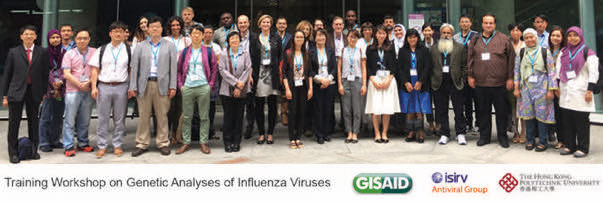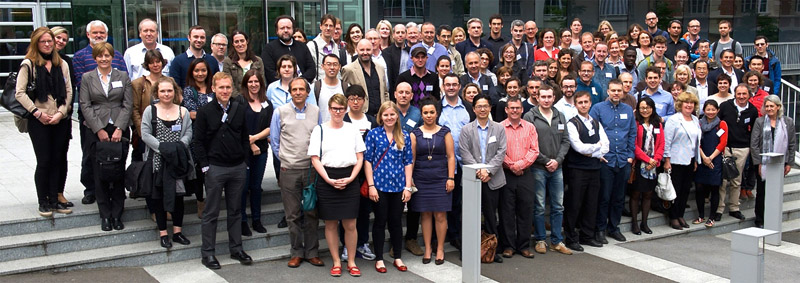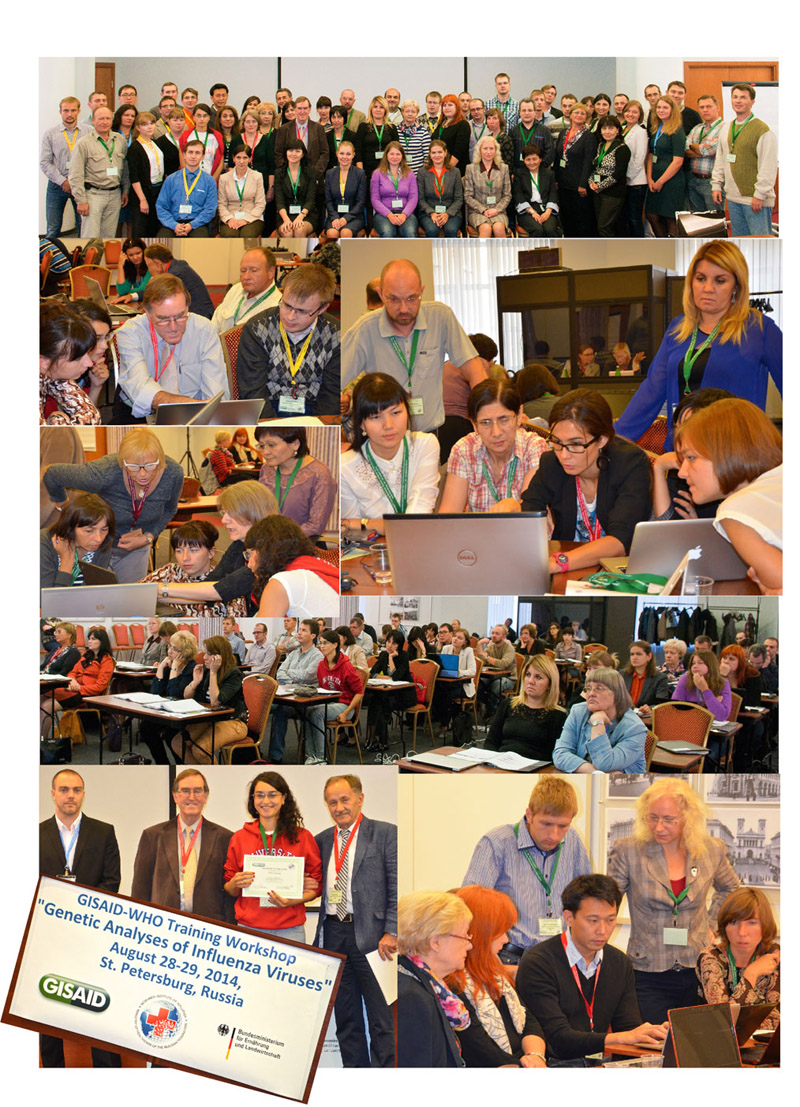GISAID-WHO Training Workshop at Options XII | Australia, 2024
GISAID-WHO Bioinformatics Training at the University of Queensland
Brisbane, 28 September 2024
GISAID, in collaboration with the World Health Organization's Global Influenza Programme (GIP) and the WHO Collaborating Centre for Reference and Research on Influenza at The Peter Doherty Institute for Infection & Immunity, held a bioinformatics training workshop on the St. Lucia Campus of the University of Queensland, Australia.
The training was aimed to strengthen national, regional and global genomic surveillance capacities and capabilities within the GISRS Network, by enhancing genomic surveillance, data sharing, and bioinformatics analysis for respiratory viruses, including influenza, RSV and SARS-CoV-2.
The workshop was held on the eve of the Options XII for the Control of Influenza that showcased new developments of the GISAID Data Science platform during the in-person gathering of public health professionals and a presentation of GISAID Posters titled "Insights at your fingertips - GISAID’s Enhanced Tool Ecosystem."

GISAID Academy | Indonesia, 2024
 GISAID Academy - Accelerated NGS Bioinformatics I
GISAID Academy - Accelerated NGS Bioinformatics I
Kura Kura Bali, 18-21 April 2024
Indonesia's Ministry of Health invited researchers from 22 public health laboratories across its archipelago and Southeast Asia (incl. Cambodia, Laos, Myanmar, Philippines), to take part in the inaugural class of the GISAID Academy on the Island of Bali. Based on the Balinese philosophy of life Tri Hita Karana the three ways to happiness or harmony, a four-day bioinformatics training retreat was held on the idyllic United In Diversity Bali Campus, featuring state-of-the-art learning facilities.
GISAID's comprehensive programme elevates the ability of participants to harness NGS data for public health response, with topics spanning from foundational NGS data processing and phylogenetic analyses, to instructions on standard and advanced features & functionalities and use of integrated tools for analysis on the GISAID platform.
> see more

GISAID-WHO Training Workshop at Options XI | Northern Ireland, 2022

GISAID Bioinformatics Training at Queen’s University Belfast
Belfast, 27-29 September 2022
GISAID, in collaboration with the World Health Organization's Global Influenza Programme (GIP), held a three-day bioinformatics training workshop on the campus of Queen’s University Belfast. The educational programme was also attended virtually by researchers from around the globe and included instructions on standard and advanced features & functionalities and use of integrated tools for analysis on the GISAID platform.
GISAID-WHO Bioinformatics Training Workshop | Madagascar, 2018
GISAID Bioinformatics Training Workshop
Madagascar, 22 - 23 March 2018
During the 6th African Network for the Surveillance of Influenza (ANISE) in Antananarivo, GISAID and isirv - in collaboration with Institut Pasteur de Madagascar and the World Health Organization’s Global Influenza Programme (GIP), supported by USAID - held a two-day training workshop on genetic sequence analysis of influenza viruses to provide training for monitoring sequence variation among influenza viruses in relation to surveillance of influenza epidemics and detection of resistance to influenza antiviral drugs.

GISAID-isirv-WHO Training Workshop at Options IX | USA, 2016
Bioinformatics Training at Options for the Control of Influenza IX
Chicago, 29 August 2016
GISAID and isirv, in collaboration with the World Health Organization’s Global Influenza Programme (GIP) and the Global Influenza Surveillance and Response System (GISRS) held a training workshop on genetic sequence analysis of influenza viruses to provide training in the use of the GISAID EpiFlu™ database for monitoring sequence variation among influenza viruses in relation to surveillance of influenza epidemics and detection of resistance to influenza antiviral drugs.

GISAID Bioinformatics Workshop | Hong Kong, 2015
Training Workshop on Genetic Analyses of Influenza Viruses
Hong Kong, 21-22 November 2015
A 2-day training workshop on genetic analyses of influenza viruses, in conjunction with the WHO Global Influenza Surveillance and Response System and the Hong Kong Polytechnic University, was held at the Polytechnic University.
33 trainees, from 24 countries, received instruction in the use of GISAID’s new EpiFlu™ 2.0 database application, with an introduction of novel features and advanced analysis tools, for the identification and interpretation of mutations, underlying the evolution and antigenic variation of human and animal influenza viruses. Participants received financial support from the WHO, its Western Pacific regional office and isirv.

GISAID NGS Workshop | France, 2015
Next Generation Sequencing (NGS) of Viruses
Paris, 20-21 May 2015
A Workshop on NGS organized by GISAID in conjunction with the isirv-Antiviral Group and the PREDEMICS Consortium, was held at the Institute Pasteur, Paris.
The 2-day expert workshop attracted 117 registered participants from 18 countries, more than expected and almost full capacity (125) of the auditorium. The program covered various aspects of current sequencing technologies, data processing and analysis of data for a variety of RNA viruses, with a particular focus on quality and interpretation of results and the significance and use of NGS data for public and animal health.
The success of the workshop was reflected in some excellent feedback, in particular as regards its timeliness, coverage of the different sequence platforms and analysis pipelines, and variety of RNA viruses discussed. Many participants saw this workshop as a prelude to a subsequent hands-on workshop with more in-depth bioinformatics training.

GISAID-WHO Training Workshop | Russian Federation, 2014
Genetic Analyses of Influenza Viruses
Saint Petersburg, 28-29 August 2014
The GISAID-WHO Training Workshop was organized by the Research Institute of Influenza of the Russian Federation in collaboration with GISAID and the WHO Regional Office for Europe, with generous financial support from the WHO's Global Influenza Programme (GIP) and the Federal Republic of Germany. The 2-day training workshop attracted 39 trainees from Russia and the 8 CIS countries, Georgia, Ukraine and the 3 Baltic States, 11 of which were from veterinary/animal health institutions.
The purpose of the workshop was to enable laboratories interested in influenza to benefit from the extensive cumulative data in the GISAID EpiFlu™ database, in relation to the epidemiology of human and animal influenza, the evolution of influenza viruses and the emergence and spread of novel genetic (and antigenic) variants.
In particular, training in the use of the database was aimed at assisting animal and human health laboratories to understand the significance of sequence data on ‘their’ influenza viruses in relation to viruses circulating more widely, especially during outbreaks and epidemics, and at promoting increased interaction between veterinary and public health institutions involved in influenza surveillance and research.
> see more

GISAID-WHO Training Workshop at Options VIII | South Africa, 2013
 Options for the Control of Influenza VIII
Options for the Control of Influenza VIII
Cape Town, 7 September 2013
GISAID and the isirv Antiviral Group in collaboration with the World Health Organization’s Global Influenza Programme and the Global Influenza Surveillance and Response System (GISRS), and the support of the Federal Republic of Germany, organized a short training workshop on genetic sequence analysis of influenza viruses and molecular detection of antiviral resistance.
The topics covered by the lectures included: analysis and interpretation of sequence data on the GISAID platform; genotypic detection of mutations affecting antiviral susceptibility; influenza antivirals, emergence of resistance and surveillance; phenotypic assays of NAI susceptibility.
The purpose of the workshop was to provide training to representatives of influenza laboratories in African and other low resource countries in the use of the GISAID EpiFlu™ database for monitoring sequence variation among influenza viruses in relation to surveillance of influenza epidemics and detection of resistance to influenza antiviral drugs.
> see more


